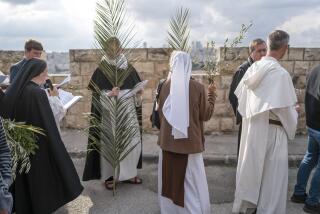A Time for Reconciliation
- Share via
Overnight, the number of people attending 8 a.m. Mass at Holy Family Catholic Cathedral in Orange went from 100 to twice that. A Century City lawyer signed up for a pilgrimage to Rome this summer. A nurse who works in Westwood is planning her wedding at St. Peter’s Cathedral at the Vatican.
Why?
Two potent words explain it: Jubilee year.
This is one of (typically) four times per century when Catholics are encouraged to be more forgiving and to make peace with “enemies.” The Jubilee is also a reason to visit one of the many churches around the world that have been designated as pilgrimage sites. Four are in Rome, a Jubilee site since 1300. But there are 20 pilgrimage sites in the archdiocese of Los Angeles alone. Holy Family Cathedral is one.
Officially, the Jubilee year started Christmas Eve, with the opening of the doors of designated churches. “I started noticing the increased numbers right after Christmas,” said Father Arthur Holquin, rector of Holy Family. “The vast majority of pilgrims are Vietnamese,” said Holquin, whose church is a half-hour drive from Little Saigon in Westminster. One recent Saturday morning, the front rows of the church were filled with Vietnamese Catholics, who arrived early to sit close to the altar.
*
They had come to fill requirements for certain blessings promised by popes since Boniface VIII in 1300. Those who journey to one of the four specific churches in Rome, or other designated churches around the world, and receive the sacrament of confession in a Jubilee year are absolved from the temporal consequences of their sins--that is, time spent in purgatory. (In Catholic theology, souls dwell in purgatory until they are purified and can enter heaven.) Pilgrims can also gain the same indulgence for loved ones who have died.
“I come to pray with my family for those who have passed away. For my grandparents,” said Tran Duc, 25, a Navy enlisted man who last saw his grandparents before he left Vietnam in 1989.
“I need to think about my sins, about how I offend God,” said Dinh Van Nguyen, a bus driver in his 40s. “It’s part of the Jubilee year.”
There are as many ways to observe Jubilee as there are believers. Christopher Fagan, 47, a Century City lawyer, plans to visit Rome this summer to reconnect with his religious roots and, as he put it, “to walk the journey and see the places where the traditions came from. I’d like to sit where St. Peter was buried and say, ‘You had your rough times.’ Maybe we need to rediscover that depth of commitment. . . . To capture the repentance and reconciliation of the Jubilee year, it seems good to go back to Rome and reconnect.”
Therese Andrysiak, a psychiatric nurse in her 50s, met her fiance at a Bible-study class in Westwood. They decided to get married in Rome, she said, “because our faith is the foundation of our relationship, and St. Peter’s is a foundation of the church. Never mind that it’s a colorful, wonderful thing to get married in Rome. There is the grandeur of St. Peter’s and the grandeur of marriage.”
*
While Catholics make prayer and spiritual renewal the center of the Jubilee year, other Christian denominations are taking their own approach to reconciliation. A number of churches are backing a movement to release the poorest countries in the world from their debts to rich countries, a controversial and complicated issue that is under discussion by governments and international financial institutions.
“The biblical idea of Jubilee fits the Protestant tradition of social justice,” said Richard Lowery, an Old Testament professor at Phillips Theological Seminary in Tulsa, Okla. “Any household property you have acquired in the last 50 years due to the owners’ indebtedness reverts back to the owner’s family,” he said, paraphrasing Chapter 8 of the Bible’s book of Leviticus. “Today’s Jubilee themes grow out of this book.”
Episcopalians, Lutherans, Methodists and Presbyterians have promoted global debt relief. The pope has endorsed it as well.
“We’re taking a powerful biblical concept and making it concrete,” said James Solheim, national spokesman for the Episcopal Church in New York.
The two Jubilee year themes, pilgrimage and good works, are not so far apart.
“In both cases, the issue is the cancellation of debt,” said the Rev. Carol Johnston, a professor of theology at the Christian Theological Seminary in Indianapolis. “Both the Catholics and the Protestants emphasize the forgiveness of sin and the restoration of the community to right balance. That is what reconciliation is all about.”
More to Read
Sign up for The Wild
We’ll help you find the best places to hike, bike and run, as well as the perfect silent spots for meditation and yoga.
You may occasionally receive promotional content from the Los Angeles Times.






